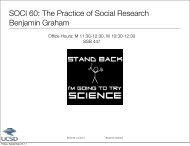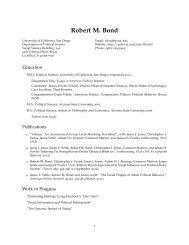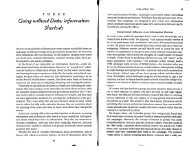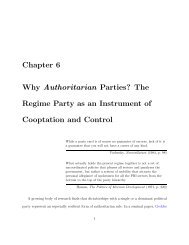The Third-Person Effect in Communication W. Phillips Davison The ...
The Third-Person Effect in Communication W. Phillips Davison The ...
The Third-Person Effect in Communication W. Phillips Davison The ...
You also want an ePaper? Increase the reach of your titles
YUMPU automatically turns print PDFs into web optimized ePapers that Google loves.
12 W. PHILLIPS DAVISON<br />
communication as a major variable to be built <strong>in</strong>to their research<br />
designs (for example, Schanck, 1932 and 1938; Colombotos et al.,<br />
1975; Fields and Schuman, 1976; O'Gorman and Garry, 1976).<br />
Schanck does, however, remark <strong>in</strong> connection with one controversy<br />
<strong>in</strong> Elm Hollow that "cont<strong>in</strong>uous advocacy of a position by a m<strong>in</strong>ority<br />
leads them (the majority) to a belief that this stand may be fairly<br />
universal <strong>in</strong> their group" (Schanck, 1938:93).<br />
To test the notion that the third-person effect plays a part <strong>in</strong> the<br />
creation of pluralistic ignorance one could, for example, determ<strong>in</strong>e<br />
whether misperception of others' attitudes is more likely to occur on<br />
issues that have been extensively discussed <strong>in</strong> the mass media than on<br />
issues that are discussed ma<strong>in</strong>ly <strong>in</strong> primary groups. <strong>The</strong> data pre-<br />
sented by Fields and Schuman suggest that this might well be the<br />
case, <strong>in</strong> that pluralistic ignorance appears to be greater <strong>in</strong> regard to<br />
issues such as race relations (discussed widely <strong>in</strong> the media) than <strong>in</strong><br />
regard to issues <strong>in</strong>volv<strong>in</strong>g ethics or morals (discussed more <strong>in</strong> primary<br />
groups).<br />
It is also possible that public communication dim<strong>in</strong>ishes mispercep-<br />
tion of others' attitudes among people <strong>in</strong> part of the media audience<br />
while it <strong>in</strong>creases misperception among some. In this connection, the<br />
concept of reference groups may prove useful <strong>in</strong> expla<strong>in</strong><strong>in</strong>g the third-<br />
person effect. Are people "like me" or "different from me" seen as<br />
be<strong>in</strong>g more affected by persuasive messages? Or is the degree of<br />
similarity not a relevant factor? If perceived congruity of others'<br />
attitudes and values with one's own is a factor <strong>in</strong> the selection of<br />
normative reference groups (S<strong>in</strong>ger, 198 1 : 73), then one would expect<br />
there to be little exaggeration <strong>in</strong> the perceived impact of a communi-<br />
cation on members of such groups. On the other hand, the importance<br />
of not overlook<strong>in</strong>g a possible change <strong>in</strong> attitude on the part of a<br />
significant other might make one assume, conservatively, that some<br />
reference group members had <strong>in</strong>deed been affected. <strong>The</strong>re is plenty of<br />
room for research and speculation.<br />
<strong>The</strong> third-person effect is probably <strong>in</strong>volved <strong>in</strong> the "spiral of si-<br />
lence" which, accord<strong>in</strong>g to a recent theory about the formation of<br />
public op<strong>in</strong>ion, leads those on one side of an issue to express their<br />
op<strong>in</strong>ions with more and more volume and confidence, while those on<br />
the other side of the issue tend to fall silent (Noelle-Neumann, 1980).<br />
In particular, exaggerated perceptions of the effects of mass media<br />
election propaganda on others would help to expla<strong>in</strong> the situations <strong>in</strong><br />
which polls show that respondents th<strong>in</strong>k Party A will w<strong>in</strong> an election<br />
even though a majority of the respondents reta<strong>in</strong> their <strong>in</strong>tention of<br />
vot<strong>in</strong>g for Party B. Each person may reason: I haven't been <strong>in</strong>flu-<br />
enced by this widely publicized nonsense, but they probably have<br />
been.











